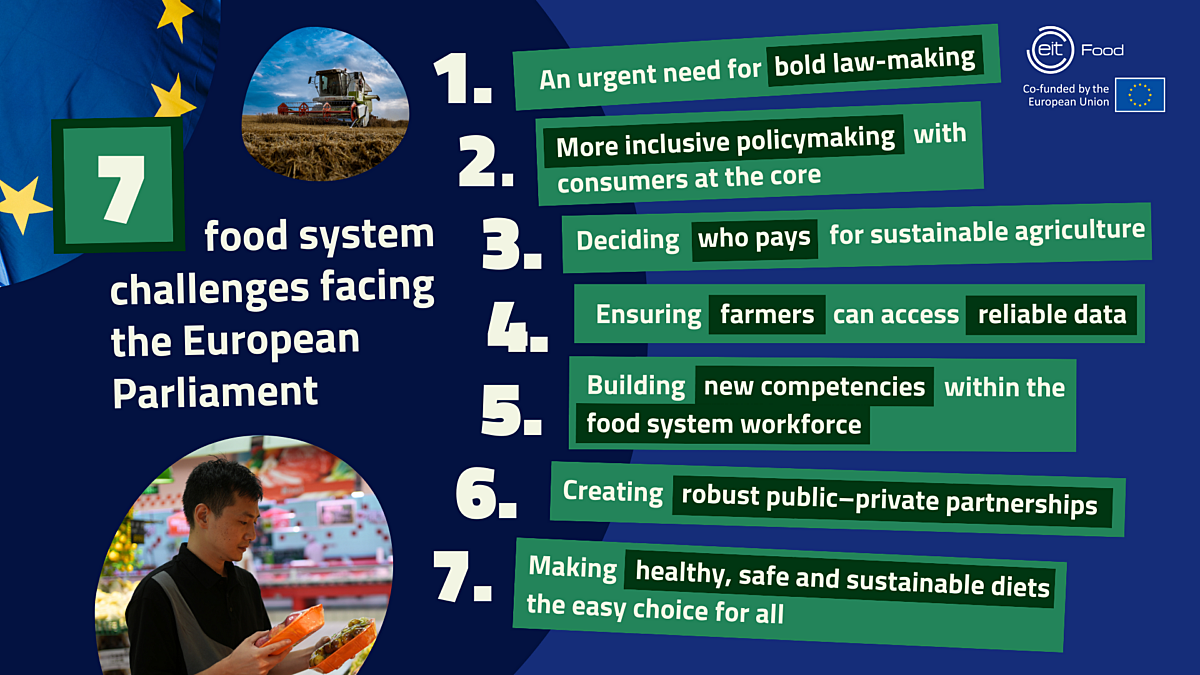
Food policy: 7 food system challenges facing the new European Parliament
What are the most pressing food system issues in Europe that decision makers should prioritise? Here we explore the diverse challenges and bring together some of the sector’s leading voices for advice on tangible policy actions.
As the newly elected European Parliament prepares to take office, we stand at a critical juncture for the future of Europe’s food system. We have an opportunity to re-energise the pursuit of an enabling policy framework for a food system that is sustainable, resilient, healthy, and competitive.
But as we saw in the previous parliamentary term, political gridlock presents challenges. Several key food policy files linked with the European Green Deal and the Farm to Fork strategy have been delayed or diluted. At EIT Food, we believe the sheer gravity of the environmental, economic and social challenges can be a unifying force. The clock is ticking.
Here we highlight seven food system opportunities and challenges facing the new Parliament. We draw on discussions from leading voices at the 2023 Future of Food Conference, which were summarised in detail in a post-event report (1).

1. An urgent need for bold food law-making
Debates around sustainability often present a false choice. We either protect and restore Europe’s natural environments, or we maintain a competitive economy. But we cannot do both. As a result, nature and climate legislation have become increasingly politicised and polarised. A high-profile example is the Nature Restoration Law – designed to preserve 30% of Europe’s land and sea for biodiversity – which was finally adopted in June 2024 after being stuck in limbo for months (2).
“We cannot miss the momentum; the new Commission must empower key players to enable the Green Deal ambition.”
Bold food policy instruments can bring positive outcomes for people, businesses and the planet, while providing clarity to investors. The European Parliament should engage strongly with the European Commission to progress key texts such as the Framework for Sustainable Food Systems (FSFS). This would streamline existing and future policies and regulations, and promote coherence, ambition, and systemic thinking. For the incoming Parliament, the challenge is to put aside political differences. Ambitious and comprehensive agrifood legislation is key for a modern food system that works for everyone.

2. More inclusive food policymaking with consumers at the core
We often have unrealistic expectations of policymakers. We expect them to foresee all possible outcomes of their policies, and for those impacted by policies to behave exactly as planned. The real world is never that simple. Food policy is particularly complicated as it intersects with health, climate, global security, and so much more. Nevertheless, participatory policymaking, engaging directly with all stakeholders, can make policy outcomes more predictable.
Never assume what consumers think and feel about food: ask them. EIT Food’s Consumer Observatory, Europe’s central hub for consumer insights on agrifood topics, has revealed that European consumers would embrace a universal eco-label on products (3), and that many people are confused about ultra-processed food (4).
"Labelling can only work as part of a more widespread push on education around healthy eating"
Policymaking should reflect consumer needs and attitudes; but overall, there is a lot of room for improvement. According to the latest EIT Food Trust Report, less than half of Europeans say they have trust in food (5). Rebuilding consumer trust in the food system can be helped by making sustainability information more reliable and understandable, through mechanisms like the Green Claims directive. Public engagement platforms such as FoodUnfolded can also help to reconnect people with the origin of their food.
3. Deciding who pays for sustainable agriculture
Many voices across society are calling for more sustainable food production. But to date, the burden for shifting towards more sustainable food production has fallen largely on farmers. That comes on top of pressures, from dwindling profit margins to environmental obligations, and a lack of young people entering the profession.
“In the last 10 years pressure is still the same, probably higher. What has changed is on one side the general awareness of all this problem and on the other the solutions offered by regenerative farming pioneers to face these pressures.”
Ultimately, the sustainable transition in agriculture is a financial decision affecting all EU taxpayers. While the annual cost is estimated between €37 and €52 billion (6), the price of not acting is equally substantial. Soil degradation costs €50 billion a year (7), while non-communicable diseases linked with diets are driving up healthcare costs. Given the scale of the challenge, and risks of food insecurity, a dedicated funding mechanism for the agricultural transition is crucial.
Europe also requires a better mix of subsidies and private investments. Stronger coordination is needed between the European Investment Bank, European investment fund, and regional budgets to support local and context-dependent innovation. Many have also pointed out how Common Agricultural Policy (CAP) subsidies do not accurately reward environmental practices – a review of payment conditionalities can be a key driver of change
Collaborative approaches are also needed closer to the ground. Through the Regenerative Innovation portfolio, EIT Food has committed €15 million over three years, matching private corporate investment to pilot innovative solutions. By taking a landscape-based approach, the scheme can reduce risks for individual farms and facilitate knowledge-sharing within regions.

4. Ensuring farmers can access reliable data
In the pursuit of a net zero food system, regenerative agriculture is a win-win. It can be less carbon intensive than conventional farming, and healthy soils can store more carbon (8). But without access to relevant and accessible data, farmers are working in the dark. Food producers need to see whether changes have the intended positive effects.
“What kind of data do we really need?”
By 2028, farmers should be able to access carbon production data as seamlessly as they do other metrics, such as feed purchase. To become a reality, further investment is needed to develop infrastructure and connectivity in Europe. And costs for data collection techniques like soil probes, satellite-based imagery and AI need to be reduced. At the EU level, carbon removal certification methodologies should be consistent and lab procedures harmonised.
Data can also help farmers to improve yields and anticipate challenges such as drought and crop disease. Costs can be reduced through initiatives that enable the sharing of knowledge and resources between farms, with farmers always having a say in how their data is collected, used, and shared. Innovators can be assisted through projects such as Test Farms, which bridge the gap between new technology and agricultural applications.
5. Building new competencies within the food system workforce
Food-related challenges are evolving rapidly; so are the skills required to tackle them. Young people should be empowered globally to develop leadership capabilities, and to help shape the future of food. A great example is the Girls Go Circular online learning programme, which has equipped 40,000+ schoolgirls aged 14-19 across Europe with digital and entrepreneurial skills. Circular economies are needed for a more sustainable food system by using resources more efficiently and valorising food waste.

People at all stages of their career should have access to education and development opportunities. Through its Learning Services, EIT Food is building the skills and competencies in the European food system – from focused training for farmers and industry, right through to its Food System Master of Science programme.
Europe’s food system can become more resilient by embracing emerging technologies such as AI and robotics. All stakeholders can contribute to building the competencies needed for working with these disruptive technologies, and managing their risks. A good source will be the Deep Tech Talent Initiative, which is calling on industry to help skill one million people within deep tech fields by the end of 2025.
6. Creating robust public–private partnerships
Debates about the influence of the private sector in Europe have been a long-standing feature of the European Parliament. But are interests really as divided as some portray? In economic terms alone, the long-term viability of most industries relies to some degree on the health and sustainability of natural resources.
“We need to bring different players together, if we want to have system-wide impact.”
Under the right governance, public–private partnerships will be an essential part of the food systems transition. They can foster collaboration, knowledge exchange, and resource sharing between governments, businesses, and civil society organisations. Crucially, public–private collaborations can elevate existing efforts. That is the concept behind the Impact Funding Framework, through which EIT Food co-funds and co-resources programmes that align with our three core missions to:
- Improve the impact of diet on obesity and non-communicable disease
- Reduce food-system-related environmental harms
- Deal with the threats posed by food integrity and complex supply chains
7. Making healthy, safe and sustainable diets the easy choice for all
The science is increasingly clear. Diets high in ultra-processed foods may increase the risk of some cancers, overweight and obesity, along with other non-communicable diseases (9). But simply warning of health risks is not enough. Healthy diets should become the most convenient and accessible choice for everyone.

Policies aimed at shifting diets should be informed by insights from behavioural science. Rather than blunt policy instruments, the goal should be to develop food environments where consumers are nudged towards choosing healthy and sustainable options. Think tanks are another useful tool for engaging with complex food system challenges. EIT Food’s think tanks on Protein Diversification and Healthy Ageing bring experts from food policy and industry together to tackle shared challenges.
In consumer surveys, price, convenience and taste regularly come out top for driving consumer behaviour (10). So, another priority should be to foster cooperation with the food industry to reformulate products, decrease portion sizes, and promote healthier options. Innovations in this space could be accelerated by streamlining the novel food approval process in Europe. Likewise, reviving the EU Protein Strategy can ensure health and environmental challenges are tackled in a joined-up manner.
References
- EIT Food: A Supportive Policy Framework For Food Systems Transformation (2024)
- Euractiv: EU countries rubberstamp Nature Restoration Law after months of deadlock
- EIT Food Consumer Observatory: Whitepaper: will consumers accept a universal eco-label with open arms?
- EIT Food Consumer Observatory: How do European consumers feel about ultra-processed foods?
- EIT Food Consumer Observatory: Trust Report 2023
- European Commission: Proposal for Directive of the European Parliament and of the Council on Soil Monitoring and Resilience (2023)
- European Commission: Questions and Answers on a Directive on Soil Monitoring and Resilience (2023)
- EIT Food: A Net Zero Food System Insight Report (2023)
- BMJ: Ultra-processed food exposure and adverse health outcomes: umbrella review of epidemiological meta-analyses, (2024) doi: https://doi.org/10.1136/bmj-2023-077310
- Journal of Cleaner Production: Consumers’ perceptions on food-related sustainability: A systematic review (2022) https://doi.org/10.1016/j.jclepro.2022.130904








